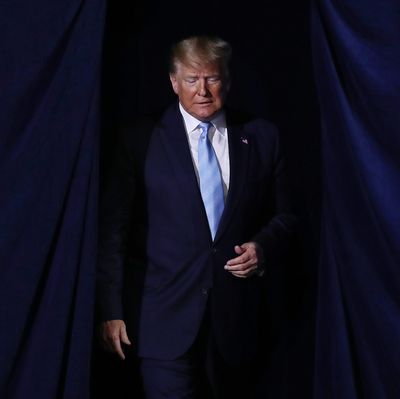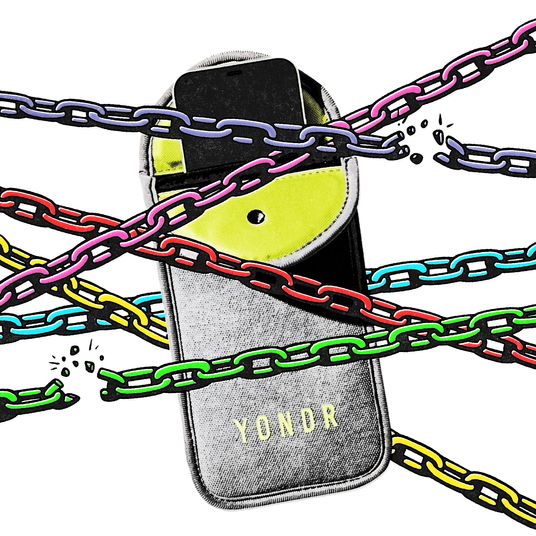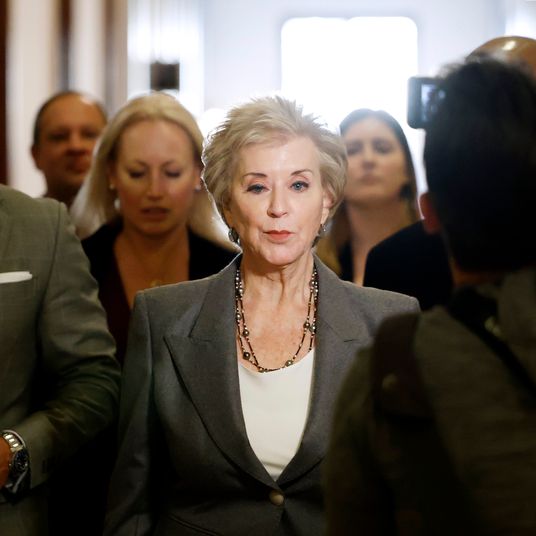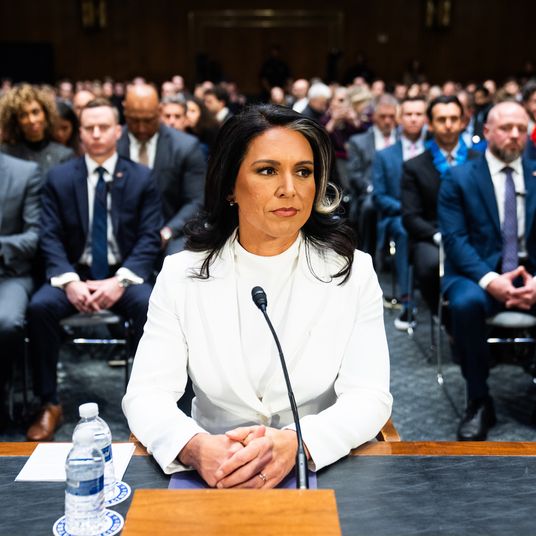
The Iran conflict has placed President Trump in a heretofore novel position of outflanking his domestic foes as a hawk. Having previously cast himself as a deal-maker or isolationist, Trump now occupies — at least temporarily — the traditional Republican identity of war fighter, punishing the world’s villains. His supporters are taking advantage by employing the familiar conservative message in such situations: accusing their opponents of actively sympathizing with the enemy.
“The only ones mourning the loss of [Iranian general Qasem] Soleimani are our Democrat leadership and Democrat Presidential candidates,” says Nikki Haley. Because she has previously established a modicum of independence from Trump,Haley has received the most attention for this remark, but she is hardly alone. Kellyanne Conway sneers, “The alarmists and apologists show skepticism about our own intelligence and sympathy for Soleimani.” Republican apparatchik Tony Shaffer attacks “Democrat lawmakers who would rather mourn a war criminal than credit President Trump for making the world safer.” And so on.
The accusation is obviously a risible lie. No prominent Democrat — indeed, as far as I know, no Democrat at all — has “mourned” Soleimani, defended his conduct, or suggested the world was a better place with him in it. The question is whether the act of killing him on net enhances America’s safety and diplomatic standing.
The world has many brutal and murderous men, most of whose deaths would leave us better off, but whom it would be unwise for the United States to kill. There is a categorical difference between actively praising and approving of a bad guy and opposing a military strike against him.
What makes this current smear campaign so extraordinarily ironic is that Trump is actually guilty of the very thing his surrogates are falsely charging his opposition. Trump has repeatedly lavished praise on the world’s most notorious dictators. Trump in 2016 praised Saddam Hussein’s methods of killing terrorists: “He did that so good. They didn’t read them the rights. They didn’t talk. They were terrorists. Over.” Trump’s point was not only that the United States was unwise to remove Saddam Hussein from power, but edged into outright admiration for his unlawful methods.
This is a theme he has voiced over and over. Trump on Vladimir Putin: “The man has very strong control over a country. Now, it’s a very different system and I don’t happen to like the system, but certainly in that system, he’s been a leader. Far more than our president has been a leader.” On Saudi Crown Prince Mohammed bin Salman: “A strong person, he has very good control.” On Xi Xinping: “He’s a strong gentleman, right? Anybody that — he’s a strong guy, tough guy … President Xi, who is a strong man, I call him King, he said, ‘But I am not King, I am president.’ I said, ‘No, you’re president for life and therefore, you’re King.’ He said, ‘Huh. Huh.’ He liked that.”
Trump’s praise for dictators is not merely some cold-eyed assessment of their power, but often overflows into personal admiration and warmth. On Recep Erdogan, he said, “It’s my honor to be with a friend of mine, somebody I’ve become very close to, in many respects, and he’s doing a very good job: the President of Turkey.” He told Philippines strongman Rodrigo Duterte, “I just wanted to congratulate you because I am hearing of the unbelievable job on the drug problem.” He famously praised Kim Jong Un as “somebody that I’ve gotten to know very well and respect” and boasted that the two “fell in love.”
Trump has defended his outpouring of affection for some of these murderers as the only alternative to war. He has baselessly claimed Barack Obama and Hillary Clinton were headed into nuclear war with North Korea and Russia but for his own deft diplomacy averting those conflicts.
The truth is that Trump does not merely believe in the need to do business with the thugs and murderers of the world. He prefers it. He sees them as strong, their authoritarian methods preferable to the restraints of the democratic world. That Trumpists can turn around from ignoring or justifying his professed love of dictators to accusing Democrats of supporting an Iranian militarist merely shows the mental flexibility required of the president’s defenders.






























